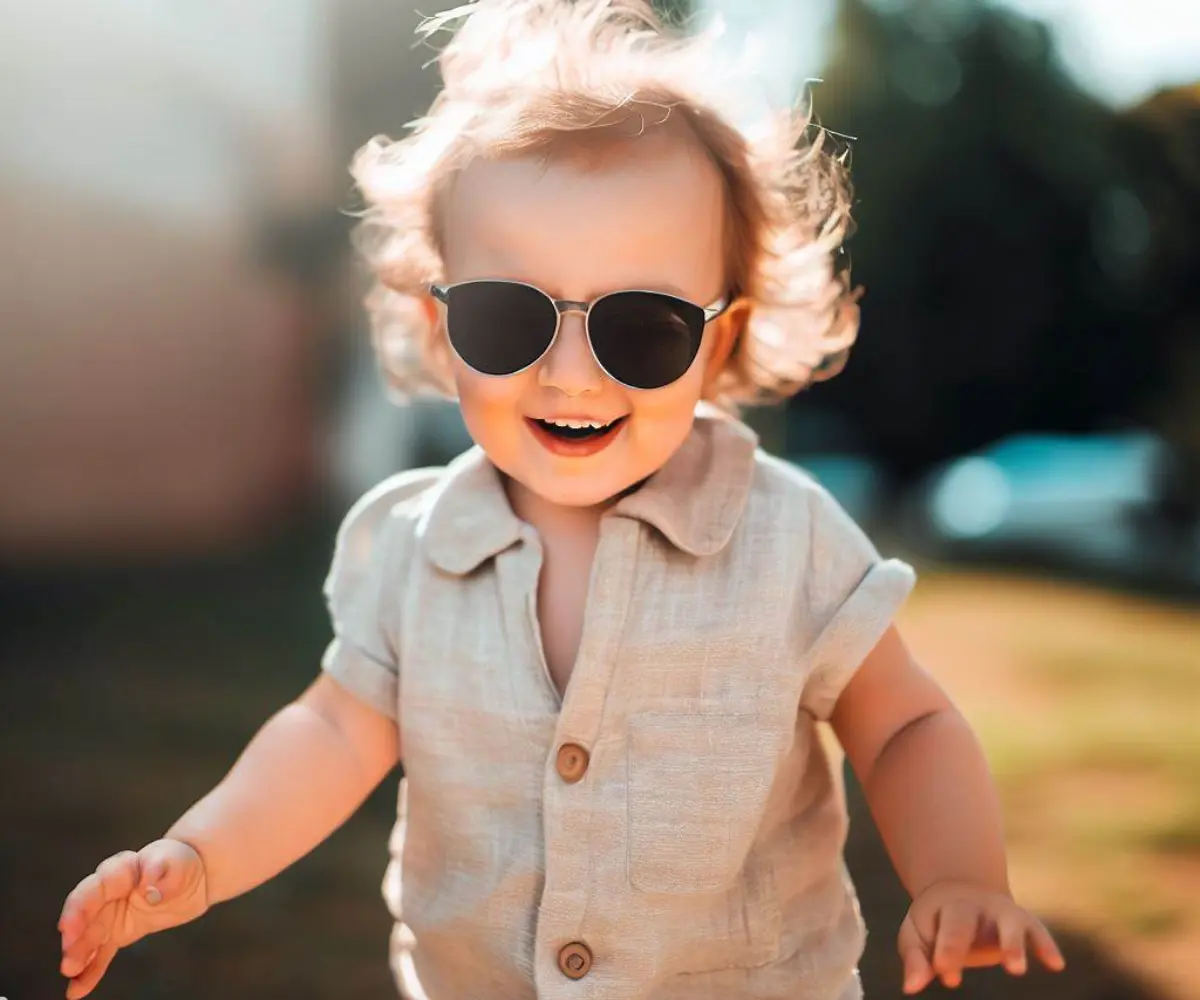Do babies need sunglasses? As a parent, I know you’ve probably wondered about whether your little one needs UV eye protection. I used to think sunglasses were just a cute accessory on infants. But it turns out, there’s some serious science showing that babies’ eyes are especially vulnerable to sun damage!
In this article, we’ll take an honest look at the risks to your child’s vision and when it’s appropriate to start using sunglasses. I’ll share tips from pediatric eye doctors for finding the right baby shades – because safety has to come before sheer cuteness! By the end, you’ll feel confident making the best choice for protecting your baby’s eyes, without going overboard.
The Sun’s Damage on Delicate Eyes
Topics Covered In This Article
- 1 The Sun’s Damage on Delicate Eyes
- 2 Do Babies Need Sunglasses?
- 3 The Benefits of Baby Sunglasses
- 4 Finding the Right sunglasses Fit for babies
- 5 Tips For Keeping Baby’s Eyes Safe
- 6 Do Babies Need Goggles for Swimming?
- 7 Why Do Some Babies Need Glasses?
- 8 Do Babies Need Polarized Sunglasses?
- 9 Do Premature Babies Need Glasses?
- 10 Do Babies Need Blackout Shades?
- 11 [FAQs]: Do Babies Need Sunglasses?
- 12 Conclusion:
We all know how bright sunlight can hurt our eyes. For babies, the risks are even greater. Their pupils are larger, allowing more UV radiation in. And a baby’s lenses are more transparent, letting in more blue light that can damage the retina.
Prolonged exposure to UV rays can lead to conditions like cataracts or macular degeneration later in life. Even brief time outside adds up for little ones. Just like we lather them up with sunscreen, baby eyes need blocking too!
Do Babies Need Sunglasses?
Yes, babies do need sunglasses starting around 6-12 months old to protect their eyes from UV damage. However, it’s important to get the proper fit and introduce them gradually.
The Benefits of Baby Sunglasses
Wearing proper sunglasses shields your infant’s eyes from the sun in several key ways:
- Filters out over 99% of UVB and UVA rays
- Reduces glare that can obstruct clear vision
- Lets in less visible light to keep eyes from straining
- Prevents crow’s feet and wrinkles caused by squinting
- Safeguards view of surroundings unlike a sunhat pulled low
For babies especially prone to eye conditions like albinism, sunglasses are non-negotiable. Check with your pediatrician if you have any concerns. They can recommend the right UV protection level.
Finding the Right sunglasses Fit for babies
After examining their visual development and sun exposure, here are factors to consider:
1. Age:
Most eye doctors recommend introducing sunglasses between 6-12 months old. Newborns’ eyes are still developing and may be sensitive to stimuli. Check for cues like squinting outside.
2. Fit:
Invest in a flexible, durable pair that will adjust as baby grows. Look for adjustable straps, elasticity, and lenses not easily pulled out. Proper fit will make them less tempting to rip off!
3. Coverage:
Lenses should be big enough to shield all areas around the eyes but not rub against cheeks or brows. Curved wraparound styles help block peripheral rays.
4. Lens material:
Polycarbonate lenses are impact-resistant in case of falls. Polarized lenses reduce glare. HDVisio allows true color perception.
5. Frame shape:
Go for lightweight frames that won’t slide around easily. Rubber temple tips add grip. Oversized cat-eye shapes look cute and deliver optimal coverage.
6. UV protection:
Always check the tag for 100% UV protection. Lenses should block both UVA and UVB rays.
Once you find a pair that fits well, try them out around the house. Slowly increase wear time on short walks outside so you can monitor comfort and fit.
Tips For Keeping Baby’s Eyes Safe
In addition to quality sunglasses, here are some other ways to ensure your child’s eye health:
- Use sunshade on strollers and car windows
- Stick to the shade when outdoors
- Add a wide-brim sunhat for added protection
- Limit screen time which can strain eyes
- Feed diet rich in vitamins A, C, and E
- Have regular pediatrician eye exams
Do Babies Need Goggles for Swimming?
Chlorinated water can irritate little eyes, making goggles a smart choice when swimmers. Look for a flexible pair that forms a seal around the eyes to keep out chemicals. Straps should be adjustable for a customized fit.
Consider baby goggles starting around 6 months old. At this point, infants are more aware and comfortable wearing eyewear. Choose shatter-resistant polycarbonate lenses for safety. Introduce goggles gradually during bath time before hitting the pool.
Why Do Some Babies Need Glasses?
While uncommon, some babies are born with vision issues or develop them in early infancy that require corrective eyewear such as glasses or contacts. Here are some common reasons:
- Nearsightedness/farsightedness – Trouble seeing objects close up or far away
- Astigmatism – Blurred vision from irregular cornea curvature
- Strabismus – Misaligned eyes causing crossed or lazy eye
- Infantile cataracts – Clouding of the eye lens
Catching and treating vision problems early prevents long-term impairment. Have your baby’s first eye exam around 6 months old even without obvious issues. Pediatric eye doctors can prescribe custom glasses or contacts as needed.
Do Babies Need Polarized Sunglasses?
Polarized lenses reduce sun glare reflecting off water, sand, snow and other surfaces that can strain eyes. They help maintain color fidelity too. Babies at risk for certain eye diseases may benefit from polarized sunglasses.
However, some eye doctors recommend waiting until toddler years when kids are outdoors more actively. The dark tinting of polarized lenses could disrupt visual development in infancy. Check with your pediatric opthalmologist.
Do Premature Babies Need Glasses?
Premature babies have underdeveloped eyes that are highly light sensitive. They are at increased risk for vision problems like retinopathy of prematurity (ROP) that may necessitate glasses.
All preemies should have regular eye exams. The earlier glasses are prescribed, the better to prevent further eye damage. Special contacts or laser surgery may also be options for severe cases.
Do Babies Need Blackout Shades?
Creating a darker environment aids sleep for some babies. But total blackout can signal the brain to disrupt circadian rhythms. A very dim nightlight allows their eyes to develop naturally.
For daytime naps, look for shades that filter outside light levels but don’t block all light. Close blinds/curtains and use swaddle blankets to block excess light as needed.
[FAQs]: Do Babies Need Sunglasses?
Should a 3 month old wear sunglasses?
Sunglasses are usually not necessary for a 3 month old. At this young age, babies’ eyes are still developing and adjusting to light. Keeping them in the shade or using a stroller canopy is better sun protection.
When can I put sunglasses on my baby?
Most doctors recommend introducing sunglasses between 6-12 months when your baby has good head control. Look for flexible, durable pairs with UV protection. Check that they don’t rub or slide down.
Can a 7 month old wear sunglasses?
Yes, a 7 month old can safely wear sunglasses for short periods if properly fitted. Select a lightweight, adjustable pair that blocks 99-100% of UVA/UVB rays. Slowly increase wear time to get your baby used to them.
Why is baby face wearing sunglasses?
Babies often wear sunglasses for eye protection from harmful UV rays. Their young eyes are especially vulnerable. Sunglasses also reduce glare and let in less light to prevent straining. Proper fit ensures comfort.
Does a 4 month old need sunglasses?
Not necessarily. At 4 months, keeping your baby in the shade or using stroller covers are good precautions. Sunglasses may be too stimulating and distracting at this age when vision is still developing.
Does a 6 month old need sunglasses?
Around 6 months, you can introduce sunglasses gradually if your baby is squinting in sunlight. Look for a durable, non-irritating pair offering full UVA/UVB coverage. Make sure your baby tolerates wearing them first.
Conclusion:
So what is end result on “Do Babies Need Sunglasses or not”?
I hope this breakdown helped explain both the pros and cons of sunglasses for your little one. While excessive use could disrupt eye development, some UV blocking is crucial to prevent long-term damage. As always, consult your pediatrician if you’re unsure what’s right for your baby.
The most important thing is being informed about both the benefits and potential drawbacks of infant sunglasses. Armed with that knowledge, you can make the healthiest decisions for your child’s eyes. Protecting their vision from an early age will pay off for years to come. And you might just discover the most adorable pair of baby shades in the process!
Also Read:
Best Sunglasses for Women’s Face Shapes
Best Sunglasses for Beach Volleyball
How To Remove Scratches from Sunglasses

Walter Hendricks is a well-known authority in the eyewear industry, specializing in a diverse range of products such as gaming glasses, swimming goggles, sunglasses, eyeglasses, computer glasses, and fashionable daily-wear eyewear.
Hendricks believes in empowering his readers with in-depth information to help them choose the right glasses that blend functionality and fashion, catering to their unique lifestyle requirements.
His comprehensive reviews and informative articles provide clear insights on everything from cutting-edge gaming glasses to the latest trends in eyewear fashion. Through his work, Hendricks has proven his dedication to helping consumers make informed eyewear decisions that support both their visual needs and style preferences.

